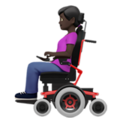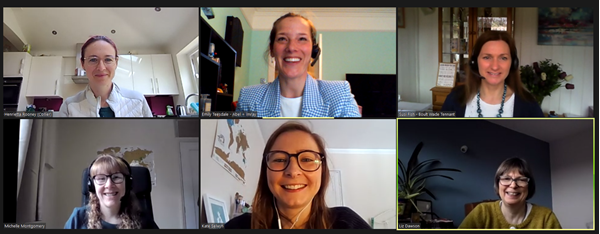We begin with an introduction from Chris Clarke of Vectura, who is co-lead of the IP Ability committee.
The IP Ability committee proposed the questions that helped shape our discussions this time. They began with something instantly thought-provoking:
1. Please review the following images then consider, what does disability look like?





The images were considered to show that disabilities are very diverse, and also that they might not always be visible. Invisible disabilities are often the ones that are not thought about, for example, mental illness, and neurodiversity. Even physical disabilities can be invisible, which is why we must not judge when we see someone using the disabled toilet or using a disabled parking space when we cannot see their disability. The term “invisible disability” rather than “hidden disability” avoids the implication that there is a need for a disability to be concealed. A similar phrase to avoid is “wheelchair-bound” – this has negative connotations and may not even be accurate: wheelchair users do not necessarily need their wheelchairs all the time.
In fact, the term “disability” itself might be interpreted differently by different people: although disability is defined in the Equality Act 2010, someone who is considered disabled by the Act may not identify as disabled themselves. In particular, disability is contextual: the setting being considered might determine whether someone has a disability or not. This reflects the fact that a person is not intrinsically disabled: they are disabled – as a passive verb – by a society that is not adapted to their needs as it is adapted to the needs of others.
In many cases, an apparent disability reflects an ability in another sphere. For example, a person with a learning disability who has communication difficulties can be really sociable, or a dyslexic person can be very capable of caring for other people and/or they may have a fabulous memory. At the end of the day, we all choose to do things that suit our abilities, and yet we don’t say we are disabled at other activities. We are just less good at them.

Screenshot from one of the London events
2. Do you think a disabled person experiences their impairment as a constant or do you think it might vary (throughout the day, the year, or a lifetime)?
The groups discussed how some experiences might be constant and others might vary on different timescales. For example, the core aspects of a diagnosis are unlikely to change, but how the person feels and is affected day-to-day may vary massively. For instance, with ME or mental illness, such as generalised anxiety disorder, the person may experience “normal” life for weeks, but then could be adversely affected on other occasions. Similarly, someone with MS may have days on which their symptoms are debilitating and days on which they are not. Good days and bad days happen to those without disabilities as well!
This has implications in the workplace, as the level to which a disability affects a person’s work might vary day-to-day. If somebody is less productive one day or one week, the employer and/or colleagues should not make assumptions about their ability to carry out the relevant tasks. Sometimes a person with a disability will be able to complete a given task but have to work twice as hard because of the interplay between the task and their disability. This should be taken into account. A disability that affects a task does not mean that it is impossible for that person.
It is important for everyone – not just disabled people – to find and understand what they are good at and then to build on their strengths. Everyone should be supported in this. It’s important not to emphasize aspects of work that are a challenge for the person with the disability. Rather, we should make things easier without making them feel that they are somehow on the outside, making them feel as comfortable as possible without being patronising.
3. What do you think we (as employers, colleagues and friends) can do to be better allies to disabled people?
It is important for workplaces to normalise the conversation about reasonable adjustments and have a culture where people feel able to say that they need something done differently in order to work to the best of their ability. This should not be seen as a negative. One way to do this would be to have standard questions on reasonable adjustments as part of the induction process, and perhaps an annual email from HR with the same questions, because a person’s needs may change after they are hired. One great idea was to include on the intranet a list of reasonable adjustments that have been made in the company to date, provided this can be properly anonymised: this means people can see that it is ok to ask for adjustments. Many adjustments are in fact very cheap and easy to implement!
Employers should also ensure that their websites make the accessibility of their offices clear, both for job applicants and for visiting clients and suppliers. Education and training, especially for partners and line managers, is vital. It’s all about encouraging people to speak in confidence and making them aware that there is support available. It’s important that the employer is receptive to talking about a disability, but the employee needs to speak out. This encouragement starts early on with the advertisement of a position: employers need to announce they can accommodate any special needs someone would need for the interview. A person asking for adjustments might still feel at risk pointing out their needs when applying for the job, but there is no other way for the employer to be aware of the special requirements and help they need to provide. Recruitment agencies are another group who can make sure this is perceived in no other but a positive way.
As colleagues and friends it is important to check our judgements, believe others’ descriptions of their experiences and remember that our experiences are not universal. As with allyship in other D&I spheres, consider inviting a colleague to a D&I event that they otherwise would not have attended. IP Ability run really informative events. You can also share and comment on D&I-related content on LinkedIn. That way your colleagues and contacts will see these issues are important to you and you will be raising their awareness.
Going forward, it is hoped that the pandemic will have made working from home a much more readily-accepted adjustment and that virtual events will continue to enable better access. However, hybrid meetings (where some are in there in person and others not) need to be considered carefully, from an IT and chairing point of view, to make sure everyone is heard and included properly, no matter where their location. Similarly, if a company develops a hybrid model with some working from home and some working in the office, care needs to be taken not to unduly penalise those at home (especially trainees) in terms of the type of work and training being given. This is a great opportunity to ensure that future working practices are more inclusive, so we should ensure that new approaches are thought through carefully (see the IP Inclusive post-lockdown inclusivity tips here).
Helpful resources
Finally, here is a list of some resources suggested during the discussions:
June coffee dates
We’ll be reporting soon on Women in IP’s June 2021 coffee dates. Keep an eye on our website page!
Page published on 12th July 2021
Page last modified on 25th January 2023





